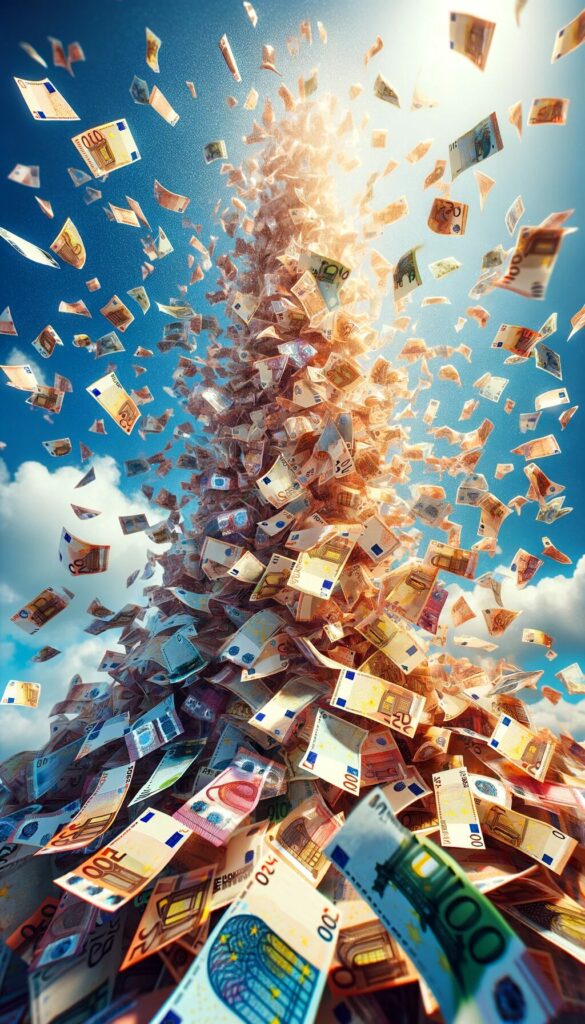Alex Tapscott: „Most of the success of the crypto market was driven by Ethereum“

His father is famous, and he is becoming famous too – at least in the crypto community. Alex Tapscott, together with his father Don (author of „Wikinomics“), wrote one of the most important books about blockchain technology – „Blockchain Revolution„. The Canadian entrepreneur and co-founder of the Blockchain Research Institute has to offer deep insights into the crypto space.
At the 4Gamechangers Festival in Vienna, Alex Tapscott sat down with Trending Topics, to talk about the seven different types of crypto assets, the role of Ethereum and his own investment strategies.
Trending Topics: You co-authored the book „Blockchain Revolution“. Why is this technology a revolution?
Alex Tapscott: The book focuses on what blockchain technology means for business, society, government and institutions. The reason why if think it is revolutionary is because the blockchain is representing the second era of the internet. For thirty years, we had the internet of information. It has been a powerful tool that changed the way we communicate and how we access information. It has democratized access to information for many people, and it hat a broadly positive impact on the world. But when it comes to commerce, how we do transactions, it actually hasn´t changed that much. We still rely on intermediaries to sit in the middle and establish trust between parties. When you send something on the internet, you don´t send the original, you are sending a copy. That is ok if it is a Wikipedia article or a pdf, but it is not ok if it is money or stocks or bonds or assets. Blockchain represents a digital medium for value and to create value peer to peer. That is the reason why blockchain will have impact on every single industry, because every industry has intermediaries, like banks or social media or data aggregators. They are the ones who capture most of the value.
By now we mainly have seen the rise crypto currencies, and they didn´t really disrupt anything yet.
I think cryptocurrencies and crypto assets are misunderstood. There isn´t just one type of cryptocurrency, and a lot of people think: Why do I need a thousand currencies, isn´t one enough? and they are probably right. But most of those things aren´t currencies. There are seven different types of crypto assets. The first kind are cryptocurrencies, and Bitcoin is the most obvious example. Bitcoin is used today by tens of millions of people all around the world and stores hundreds of billions dollars of value. The daily transaction volume is enormous.
Which are the other six types of crypto assets?
These other six types of crypto assets are more interesting than the first category. The second type are platforms like Ethereum. This platform allows you to use the native token to run applications and smart contracts on a decentralized network. These applications can attack different industries, like financial services, cloud computing or gaming. The native token is used to power these applications. The more applications run on the network, the more valuable the token becomes. Platforms like Ethereum are more interesting than cryptocurrencies like Bitcoin.
Let´s talk about the third category.
The third type are the tokens for the applications that run on top of these networks. They are called utility tokens and run on top of Ethereum or NEO or IOTA. That´s what most of the ICO volume that we´ve seen over the past couple of years. Projects have been issuing these utility tokens. you need to use them to access the services of these applications. I personally think that most of these applications don´t need a utility token, I think most of them could just use Bitcoin or Ether to move value. As a result utility tokens are the least interesting category.
Which are more interesting to you?
Number 4 will be the most interesting category over the next years: security tokens. These tokens represent equity in a company. Other than for oil for example, there is no physical assets for equity. All equities will be digitized and moved onto the blockchain, and all of the business logic will happen peer to peer. Today the global crypto asset market is roughly 350 billion dollars, the global equity market is 110 trillion. So the opportunity to migrate assets into this ecosystem is very large.
Ok. What about category number 5?
The fifth kind are natural asset tokens, digital assets that have a physical asset in the real world.
Like Venezuela´s Petro coin?
Yeah well, sort of (laughs). A coin that is backed by oil or gold or something like that. That is kind of interesting, but there is still the physical aspect of delivery, which you cannot put on the blockchain. But there are lots of opportunities to make that market more efficient.
Let´s move on to the sixth type.
These are crypto collectibles, like CryptoKitties. These are totally unique digital assets. There will be 21 million Bitcoins created, but there will only ever be one of each of these CryptoKitties. People will spend a lot of money on these things. Some of these CryptoKitties were sold for hundreds of thousands of dollars, which is absurd by the way. But the point is that there are a lot of assets in the digital and in the real world that are unique – like digital artwork, music, film, diamonds or playing cards. alle these are examples that can be digitized on the blockchain.
And the last category?
The seventh type are crypto fiat currencies and stable coins. These can be issued by governments, like the Petro, or are tokens like Tether. Both are fishy, but the category will become more developed. The make them break through, you´ll need big governments and banks. The main point here is: Beyond cryptocurrencies there is actually a huge array of usecases for these technology in the asset category. And: The blockchain can do much more than assets.
In the last months we have seen a very volatile market. Bitcoin was at almost 20.000 dollars, now is back at roughly 9.000 dollars. Why did the market explode and than crash?
Let´s put that into perspective. Two years ago the value of crypto assets was nine billion dollars. Eight billion of that was Bitcoin, and Ethereum was roughly one billion dollars. This year, the crypto asset market is at almost 400 billion dollars. Year over year, it is up tremendously. However, there was a bubble in December and January, the market went to eight hundred billion dollars and more. I think we are seeing a return to reality, and I wouldn´t be surprised if things are going lower. But long term we barely scratched the surface on what these assets are going to be worth. If Ethereum becomes the new platform for the best companies that will be created, it will be worth hundreds of billions, maybe trillions of dollars. It may not be the winner, there are a lot of competing platforms.
Did we, the media, hype cryptocurrencies? are we responsible for the bubble?
Well yeah, you guys (laughs). The media has a very confused relationship with cryptocurrencies. Sometimes you read ‚Blockchain will change the world‘, and when there is a correction, you read ‚Bitcoin is dead‘. Maybe that is what sells newspapers. No, I think most of the success of the crypto market was driven by Ethereum. Ethereum emerged as a viable second entrant into this world. All of a sudden people realized that there is a platform where you can do ICOs, where you can build applications on it, where you can run smart contracts. That led to the ICO boom. Seventy percent of the ICOs that happened over the past years have been using the Ethereum standard. With the absence of Ethereum a lot of this wouldn´t have occurred. When Ethereum emerged people saw that you can build platform, and the we saw an explosion of platforms, like EOS and Tezos and Icon and Pokadot and IOTA and NEO. These are all things that claim to compete with Ethereum. We will end up in a multi-chain world with lots of different blockchains that all interoperate. When users and businesses interact with the blockchain, they won´t think about Ethereum or EOs, they will be thinking about the blockchain.
But could it be that all this is a hype? Like there has been a hype around chatbots in the last years? Chatbots were meant to be the new apps, but so far they haven´t been a success.
I don´t think so. Chatbots and the blockchain aren´t in the same league. Chatbots are an implementation of artificial intelligence. I don´t care a about chatbots, I even hate them, but AI will be massively disruptive. Blockchain is a general purpose technology, it doesn´t change one industry, but all industries, like the internet or artificial intelligence.
You mentioned that blockchain is a big threat to intermediaries. The big Silicon Valley companies hardly ever talk about blockchain. Should they be afraid of the blockchain?
To some of them blockchain is a threat than to others. Amazon Web Services, the idea of centralized cloud computing, could potentially disrupted by decentralized cloud computing. Facebook is more likely to be disrupted. People finally will realize that when they use a product and don´t pay for it, the are the product, and they are being sold to other companies and advertisers. That will eventually lead to a shift in usage of these types of platforms. In the end, a decentralized Facebook needs to have all the same functionality, and a lot of dezentralized apps don´t even come close. Centralization is more efficient than decentralization. First you need to overcome the technical hurdles, and then you need to drive adoption. But people switch to new services fairly regularly, especially if there is an added aspect of privacy, like at Telegram, Signal or WhatsApp. Some of the value there is that it is more secure and more difficult to hack. The crypto community is in the tens of millions, and they will probably the first to adopt a new decentralized social network. Then there is a long way to two billion, but we will see.
What implication has blockchain on privacy and data protection?
Privacy is hugely important to the European Union, but it should be a priority to everyone. I think that there is a big opportunity to power individuals to take more control over their information. But that also comes with a lot of responsibility, and I´m not sure that everybody is up to the challenge of owning and processing their own digital self. so I think that there is a opportunity for businesses to make that easier.
The blockchain challenges other intermediaries too: banks. Some people claim that the blockchain will replace banks, on the other hand, a lot of banks already work with the technology.
There are lots of ways the blockchain will make banks less necessary. But there are probably a lot of use cases for them to work with blockchain. The way we move money is certainly antiquated. All of this is based on technology that is 30, 40 years old. If you are a business that sits in the middle, establishes trust and takes a fee for transactions, then you are screwed. But that is not all banks and financial services do. There are many opportunities to capture new markets, to bring new products to customers that were previously not available to you. If I were a bank, I would accumulate a lot of Ether and other tokens that will move to „proof of stake“ systems, because I will want to be a validator node on the network. That could be a new business model for traditional intermediaries. That would resemble the system of today.
So then, are decentralized networks just an utopia?
Well, no. I don´t then that they will remain decentralized. Bitcoin became very centralized very quickly. But I think that there is a better chance for blockchain to be evenly distributed than for any other technology, but there is no guarantee.
Crypto fiat currencies would be very centralized. Does it make sense for a country to create its own coin?
I think it does. If implemented correctly, a crypto fiat currencies would help to reduce friction in the economy. If you can see how the money is moving, then you can create monetary policy with more information. at the same time, crypto fiat currencies can´t be decentralized by definition. In ten years, the reserve currencies of the world will be the crypto dollar, the crypto yuan, the crypto Euro, and Bitcoin. For some many people, Bitcoin is just the better alternative than the local fiat currency. It is a better way to store value, it is an easier way to make payments. If you look at the market value of Bitcoin, it is larger than the float of currencies of many countries, for example in Africa or Latin America.
Do you invest in cryptocurrencies yourself?
Yeah (laughs). I don´t provide investment advice, but I think owning Bitcoin is a good idea. I personally would not invest in utility tokens, because it is not clear to me what the value proposition is long term. I would personally invest, and I do, in platform tokens like Ether. Right now there are a lot of platform tokens that are not pricing in the potential for them to be legitimate competitors to Ethereum. They are still priced at a fraction of what Ethereum is worth, and I think that is an interesting opportunity. In general, only invest in what you are comfortable in losing, and be knowledgeable about not only in what you are buying, but also how to store it. These days it is not so easy to invest in things beyond Bitcoin and Ethereum.
Is crypto trading a real business for you?
Investing is a big part of what I do. I also helped to launch the Blockchain Research Institute, which is one of the biggest think tanks in the world to look into use cases and challenges of the blockchain.
Last question: Will we ever find out who Satoshi Nakamoto is?
I don´t know, and I don´t think it matters. A lot of what has happened has been built by this community. There are tens of thousands of stakeholders who invested, who built companies, who created new protocols. We have to thank them as much as anyone else for creating this ecosystem that we know today.





























